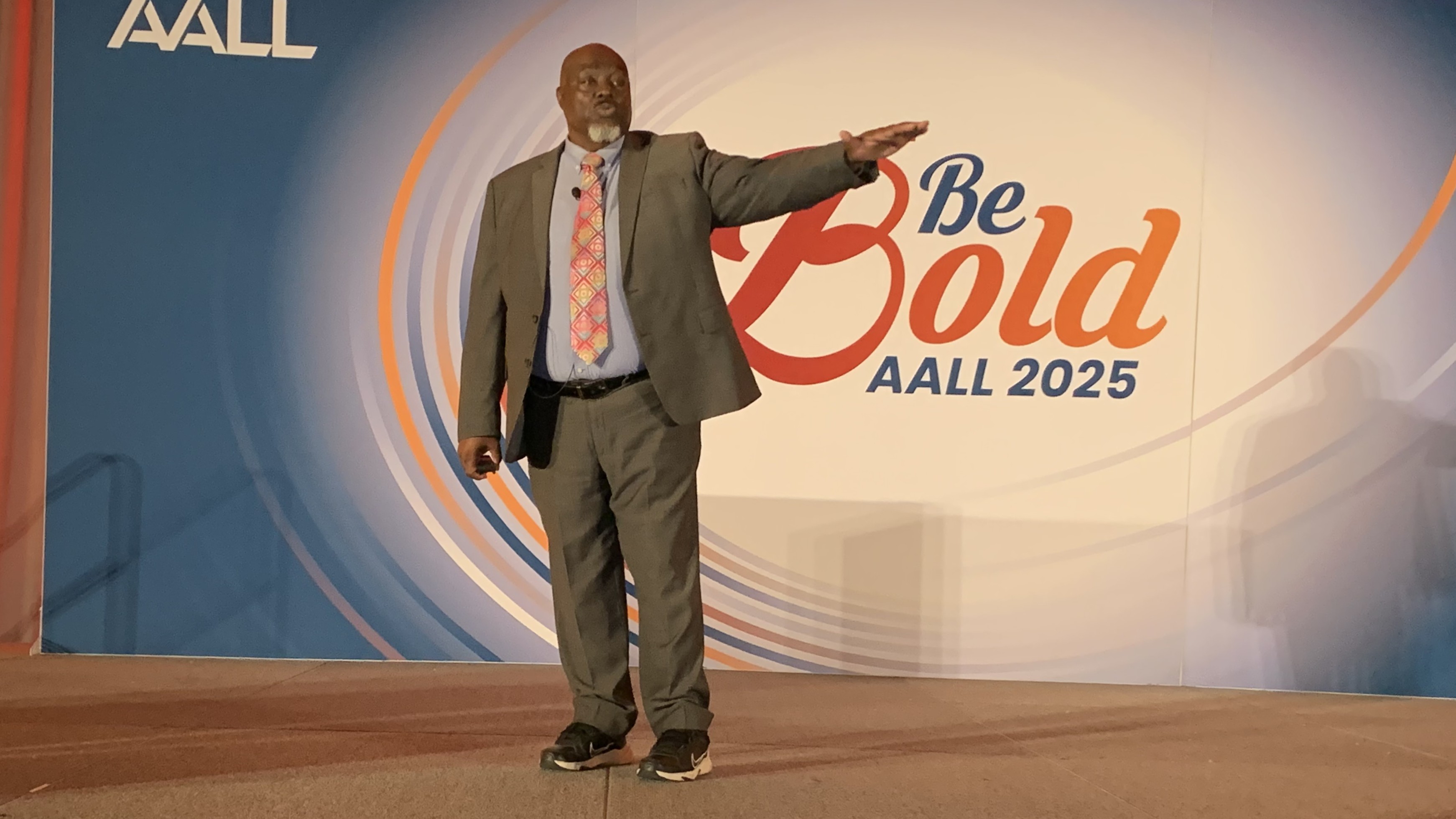In an often rousing keynote address at the annual conference of American Association of Law Libraries in Portland, Ore., yesterday, Roosevelt Weeks, director of the Fort Bend County (Texas) Library, urged law librarians to “be bold” as their profession faces unprecedented challenges and transformation.
Speaking to the hundreds of law librarians gathered for the conference, Weeks — himself a public librarian, not a law librarian — outlined four key areas where boldness is essential: supporting users, standing up for library values, facing challenges, and advancing careers. His message resonated particularly strongly given the current climate facing libraries nationwide.
Weeks, who transitioned from a well-paying technology career to librarianship after a transformative volunteer experience, delivered a keynote that was both passionate and pragmatic. He described leaving a seven-figure job in technology to join library staff making $27,500, motivated by his experience as a library volunteer, including helping a woman achieve her own career goals by training her to become certified in Microsoft Office.
“That did it for me,” Weeks told the audience, recounting how the woman brought him a blueberry pie after landing her desired job as an executive assistant. “I found out my needs. I found out what I wanted to do in life.”
Libraries Under Attack
Weeks did n0t shy away from addressing the elephant in the room: the current political climate surrounding libraries. “We are under attack. Would you agree with that or not?” he asked the audience, acknowledging that while some places in the U.S. remain “very welcoming” to libraries, others require more strategic approaches.
“You got to be strategic in what you do and be subversive in what you do,” Weeks said, urging librarians to own that characterization of themselves as subversive, but to be subversive for the right reason, which is to help others.
He stressed that intellectual freedom remains “non-negotiable,” regardless of political pressures. Drawing on both his prior experience in Austin and his current role in Fort Bend County, Weeks noted how librarians must adapt their tactics while maintaining their core principles.
Listen and Innovate
One key facet of Weeks’ message was the need for law librarians to actively listen to their users and innovate services accordingly.
“Sometimes being smart, we think we have all the answers,” he said. “But oftentimes when they come up and say, ‘I need this,’ we start formulating an answer in our mind. We can’t do that.”
He stressed the importance of serving users with empathy and creativity, recognizing that legal information users come from diverse backgrounds with varying resources.
“If you got money and power in this country, you can get access to anything you want,” Weeks said. “But what about those that don’t have that voice, that don’t have the resources?”
Embracing Technological Change
Addressing concerns about artificial intelligence and digital transformation, Weeks drew parallels to past technological disruptions. “When Google came out, people said, ‘That’s the end of libraries. We don’t need y’all anymore,'” he recalled. “But we still here.”
He encouraged librarians to view AI as another tool to master rather than a threat to fear. “AI is going to be with us in some form or fashion, and we’re going to embrace it just like we did with other technology.”
Financial Pressures and Advocacy
With many law libraries facing greater budget constraints, particularly those in the public sector, Weeks noted that many potential conference attendees could not do so because their institutions cut funding such that they cannot travel anymore.
He urged librarians to be proactive in demonstrating their value to administrators and funders. “You have to make sure they understand that you are essential,” he said. “You have to do that every day to show your value, to show that the work that you’re doing is important.”
At the same time, Weeks encouraged librarians to be supportive of library leaders such as himself and recognize the difficult decisions they face, particularly those working in government setting during politically challenging times.
“Those of you who are not in leadership, y’all truly don’t understand what we go through,” he said. “It is tough being at the top. There is nobody to talk to.”
Professional Growth
Weeks concluded with a plea for librarians to pursue individual professional development. “If you want to advance your career, if you don’t be bold in this area, shame on you,” he said. “I am not going to depend on anyone for my success.”
He emphasized the importance of networking, challenging attendees to connect with three new people before leaving the conference. “People like to work with people that they know,” he said, recalling how professional relationships had opened doors throughout his career.
Weeks also stressed the importance of knowing one’s worth and of continuing education. Despite being an executive-level librarian since 2005, he didn’t earn his library degree until 2014 – and he did so primarily in order to set an example for his staff.
A Profession at a Crossroads
Throughout his address, Weeks painted a picture of a profession at a critical juncture. While facing political attacks, budget cuts, and technological disruption, he argued that law libraries remain “central to access to justice and the democratization of legal information.”
Ultimately, his message was about empowerment – that through boldness, strategic thinking, and commitment to core values, law librarians can not only survive current challenges but emerge stronger.
“We believe in this profession,” Weeks concluded. “We believe in the work that we do. And we’re going to continue to be bold with what we stand for.”
 Robert Ambrogi Blog
Robert Ambrogi Blog